|
|
|
Sort Order |
|
|
|
Items / Page
|
|
|
|
|
|
|
| Srl | Item |
| 1 |
ID:
079632
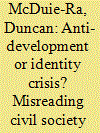

|
|
|
|
|
| Publication |
2007.
|
| Summary/Abstract |
This paper discusses the complex relationship between civil society and development in Asia by examining the role of ethnic identity in anti-development movements. Local and transnational movements by civil society actors against dams, mines, and deforestation have gained increased attention in academia and activist circles in the last decade, often used as evidence in arguments that development as part of neo-liberalism and/or state-led socialism is faltering. Furthermore, tribal, indigenous, and minority communities are often portrayed as having a closer relationship to the environment, which is seen as instrumental in their opposition to development projects. While agreeing with these arguments to some extent, this paper examines the local context of anti-development movements using research from fieldwork in the Indian state of Meghalaya and argues that struggles over development projects are also struggles over ethnic identity. In Meghalaya, civil society actors from the Khasi ethnic group have opposed several large development projects on the +grounds that these projects will attract labourers from Bangladesh and other parts of India, threatening the survival of the Khasi ethnic group. Damage to the environment, livelihoods, and loss of land are rarely a concern. The failure to recognize the influence of ethnic identity politics in critiques of development raises the risk of misreading both the extent of anti-development sentiments in civil society and the potential for development projects to be reframed by proponents into an acceptable ethnic guise. Furthermore, the actors contesting development through identity politics are overwhelmingly from urban areas, leaving rural people with limited access to civil society. This paper attempts to add a critical perspective to current literature on development and civil society using empirical examples from one of the least researched regions in Asia
|
|
|
|
|
|
|
|
|
|
|
|
|
|
|
|
| 2 |
ID:
145816
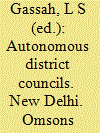

|
|
|
|
|
| Publication |
New Delhi, Omsons Publications, 1997.
|
| Description |
xi, 350p.hbk
|
| Standard Number |
8171171540
|
|
|
|
|
|
|
|
|
|
|
|
Copies: C:1/I:0,R:0,Q:0
Circulation
| Accession# | Call# | Current Location | Status | Policy | Location |
| 058702 | 352.264/GAS 058702 | Main | On Shelf | General | |
|
|
|
|
| 3 |
ID:
075239
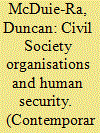

|
|
|
|
|
| Publication |
2006.
|
| Summary/Abstract |
This paper examines the limitations on civil society organisations (CSOs) in India's Northeast, specifically the state of Meghalaya, and suggests some strategies they must pursue to overcome them. The majority of literature concerning the Northeast tends to focus on national security, insurgency and violence, with a limited analysis of the role of CSOs and the human security of people living in these circumstances. CSOs in the Northeast face restrictions from above by the central government and the military, and from below by insurgent organisations and ethno-nationalist movements; in other words, by civil society itself. While the struggle for autonomy and rights in the Northeast looks set to continue, the effectiveness of CSOs is being further jeopardised as they are caught between these more powerful actors. The functioning of CSOs is being curtailed, and the lives and needs of people living between these poles are being neglected. Using Meghalaya as an example, this paper discusses the consequences for human security and the limitations faced by CSOs operating in the region. The paper argues that, in order to more effectively empower the people in the region, CSOs need to transcend co-optation from above and below, and focus on local human security issues rather than nationalist or ethno-nationalist agendas.
|
|
|
|
|
|
|
|
|
|
|
|
|
|
|
|
| 4 |
ID:
144687
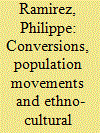

|
|
|
|
|
| Summary/Abstract |
In Northeast India, ethnic and religious conversions may be intimately associated. In the Assam–Meghalaya borderlands, conversions to Christianity throughout the twentieth century introduced a new factor in the interplay of spatial movements and cultural mutations, without fundamentally disrupting its basic principles. It is these complex dynamics that are described in this article through the history of three localities. Epidemics, religious conversions and cultural segmentation largely account for the present distribution of ethnicities.
|
|
|
|
|
|
|
|
|
|
|
|
|
|
|
|
| 5 |
ID:
119395
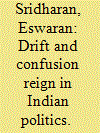

|
|
|
|
|
| Publication |
2013.
|
| Summary/Abstract |
[T]he prospect of India without a stable governing coalition-whether established by the Congress Party, by the BJP, or by regional parties supported by either the Congress or the BJP-is not beyond the realm of possibility.
|
|
|
|
|
|
|
|
|
|
|
|
|
|
|
|
| 6 |
ID:
129842
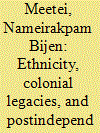

|
|
|
|
|
| Publication |
2014.
|
| Summary/Abstract |
The idea of indigenousness has been evoked to legitimize group exclusive claims including separate territories in North-East India. By analyzing experiences in Meghalaya and Manipur, the article argues that the colonial ethnic categorization that produced "ethnic conglomerates" has generated a number of problems leading to conflict in the postindependence period. First, certain composite identities have been formed by bringing together under a single umbrella a range of distinct indigenous groups' identity, often leading to the suppression of smaller identities within the larger group. Thus, the smaller groups struggle to have their own identities recognized. Furthermore, the imposed ethnic categorization has enabled the contemporary political class, which has simply perpetuated the colonial system, to use cultural identity and "indigenousness" instrumentally to their own advantage.
|
|
|
|
|
|
|
|
|
|
|
|
|
|
|
|
| 7 |
ID:
176640
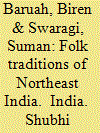

|
|
|
|
|
| Publication |
India, Shubhi Publications, 2019.
|
| Description |
137p.Hbk
|
| Standard Number |
9788182903074
|
|
|
|
|
|
|
|
|
|
|
|
Copies: C:1/I:0,R:0,Q:0
Circulation
| Accession# | Call# | Current Location | Status | Policy | Location |
| 059954 | 398.09541/BAR 059954 | Main | On Shelf | General | |
|
|
|
|
| 8 |
ID:
025326
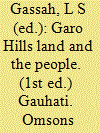

|
|
|
|
|
| Edition |
1st ed.
|
| Publication |
Gauhati, Omsons Publications, 1985.
|
| Description |
xiv, 235p.hbk
|
|
|
|
|
|
|
|
|
|
|
|
Copies: C:1/I:0,R:0,Q:0
Circulation
| Accession# | Call# | Current Location | Status | Policy | Location |
| 023180 | 954.164/GAS 023180 | Main | On Shelf | General | |
|
|
|
|
| 9 |
ID:
126648
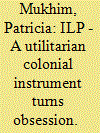

|
|
|
| 10 |
ID:
177794
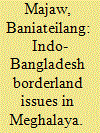

|
|
|
|
|
| Summary/Abstract |
Based on direct observation and primary local perspectives, this article examines experiences of cross-border movements in the borderland between Meghalaya and Bangladesh. It shows that the Indo-Bangladesh border is indeed an international border, but remains extremely porous for local people, with wide-ranging implications that raise theoretical issues about notions of ‘border’, but also prompt serious questions about local development, safety, security and citizenship in these peripheral borderlands.
|
|
|
|
|
|
|
|
|
|
|
|
|
|
|
|
| 11 |
ID:
131611
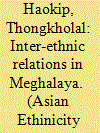

|
|
|
|
|
| Publication |
2014.
|
| Summary/Abstract |
The Indian state of Meghalaya, since its creation in 1972, had been raven by ethnic conflicts between the indigenous tribes and settler non-tribal communities. The domination of business establishments, labour force and other employment opportunities by settlers who are mainly economic migrants from Bangladesh, Nepal and other parts of India resulted in anxiousness among the native locals, resulting in three ethnic riots between indigenous tribals and settler non-tribal communities. By the turn of the twentieth century the state witnessed a relative change in the nature of relations between the ethnic communities. While the relations between the indigenous tribals and settler communities have relatively improved, ethnic tensions shifted to the indigenous tribes. This article uses the perceived threat hypothesis and a combination of rational choice theory and interpretivism to explain empirically observed realities in Meghalaya. Emphasis is placed on the post-1992 period, focusing on the emerging ethnic relations between the indigenous tribes of Meghalaya.
|
|
|
|
|
|
|
|
|
|
|
|
|
|
|
|
| 12 |
ID:
164336
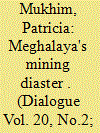

|
|
|
| 13 |
ID:
150946
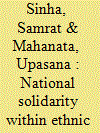

|
|
|
| 14 |
ID:
159651
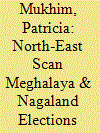

|
|
|
| 15 |
ID:
053578
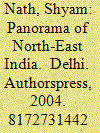

|
|
|
|
|
| Publication |
DelhI, Authorspress, 2004.
|
| Description |
v, 227p.hbk
|
| Standard Number |
8172731442
|
|
|
|
|
|
|
|
|
|
|
|
Copies: C:1/I:0,R:0,Q:0
Circulation
| Accession# | Call# | Current Location | Status | Policy | Location |
| 048586 | 954.1/NAT 048586 | Main | On Shelf | General | |
|
|
|
|
| 16 |
ID:
157041
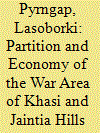

|
|
|
| 17 |
ID:
103564
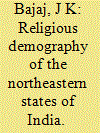

|
|
|
| 18 |
ID:
157090
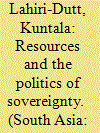

|
|
|
|
|
| Summary/Abstract |
This paper analyses the socio-legal and political spaces within which coal is mined in India and asks if it is possible to raise the ‘moral question’ when the state attributes an iconic status to coal. The empirical evidence comes from two indigenous-dominated states that practise community coal mining. If the coal mining communities in Jharkhand exert a moral claim by mining illegally, those in Meghalaya exert a political claim by invoking the special status the state enjoys under the Indian Constitution. This paper examines this grey zone of non-legality in order to understand resource conflicts and dispossession beyond the straightforward distinctions between legal and illegal.
|
|
|
|
|
|
|
|
|
|
|
|
|
|
|
|
| 19 |
ID:
059517
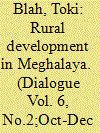

|
|
|
|
|
| Publication |
Oct-Dec 2004.
|
|
|
|
|
|
|
|
|
|
|
|
|
|
|
|
| 20 |
ID:
052451
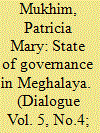

|
|
|
|
|
| Publication |
Apr-Jun 2004.
|
|
|
|
|
|
|
|
|
|
|
|
|
|
|
|
|
|
|
|
|